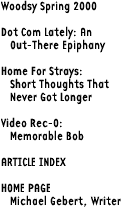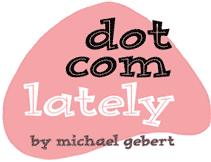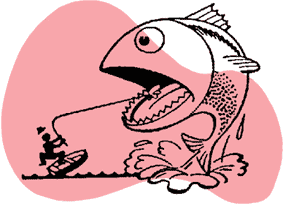


I KNOW THE MOMENT WHEN ALL THOSE irreverent, out-there dot-com ads went too far for me. It was a radio ad for Drugstore.com, with an actor relating a supposedly heartwarming, humorously over-the-top memory of shopping in the real world. Behind him played some strangely familiar drippy music, sarcastically overdoing the warmth. Suddenly I realized where I had heard the music before: in an award-winning public issues TV spot that I myself had done about a decade earlier. Which, I assure you, was not supposed to be funny.
Okay, in my own defense I hadn’t been that crazy about the music in the first place, and when we recut the spot for a new campaign a year later, I was the one who pushed for a new, less flowery track. (No, really. Fine, believe what you want.) But it’s funny to find myself on the wrong side of history here—I’ve spent years trying (and occasionally even succeeding) to sell funny, witty, zany work. And suddenly I’m the sincere old schoolmarm some bunch of kooky dot-com punks is making fun of.

Hacks will no doubt take the backlash against dot-com wackiness as an excuse to go back to earnest talking heads and smarm-and-fuzzy—but hacks would be hacks regardless. The real lesson of the dot-com ad boom and bust is that out-there humor is now officially among our legitimate tools— advertising finally recognizes that we live in a post-Letterman world. But it’s also that being genuinely funny is a lot harder than just being bizarre... as Bob Hope told Jerry Colonna, and could have told Andy Kaufman.
Go to Home For Strays
ADDENDUM: You know who did funny, seriously funny, ads? Bob and Ray. There’s a new collection of their work with ads both real, like the famous ones for Piels beer, and fake, like “Mushies, the cereal that gets soggy even without milk,” at www.bobandray.com